evolution
Friday Harbor
12/05/16 12:47
Done teaching for the spring. Whew.
For the first time, however, I'm actually teaching in the summer. I've done a Maymester course with Jim Hamrick for OTS, but generally I use the summer for research, travel, R&R, writing proposals. This year I'm delighted to be an instructor at Friday Harbor marine lab, one of the most amazing places in the world to be a biologist and interact with other amazing biologists.
One of the few downsides, however, is that to do research there - the exact projects we have proposed - means getting our act together ahead of time, knowing exactly what we need and when we need it. A lot of equipment and supplies are already at FHL, but that doesn't mean they are laying dormant waiting for us. Cooperating with the whole crew at Friday Harbor is, of course, part of the experience of getting research done close to the field (unless you are lucky enough to live there!).
So, this month is a good time for me to be in the lab. All the undergrads are gone, and as it turns out after 20 years I'm pretty good at rocking out a PCR here, a gel there, organizing equipment and supplies, and thinking of how amazing it will be when I'm there.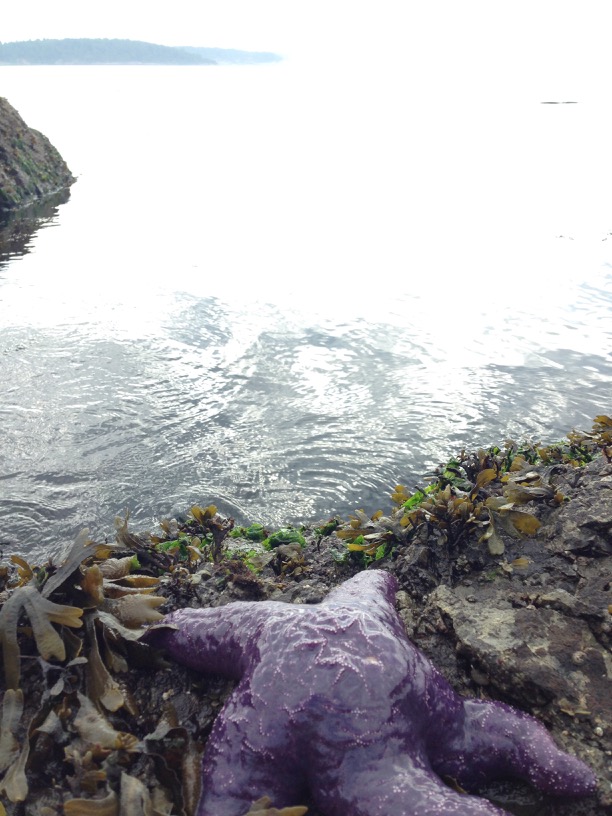
For the first time, however, I'm actually teaching in the summer. I've done a Maymester course with Jim Hamrick for OTS, but generally I use the summer for research, travel, R&R, writing proposals. This year I'm delighted to be an instructor at Friday Harbor marine lab, one of the most amazing places in the world to be a biologist and interact with other amazing biologists.
One of the few downsides, however, is that to do research there - the exact projects we have proposed - means getting our act together ahead of time, knowing exactly what we need and when we need it. A lot of equipment and supplies are already at FHL, but that doesn't mean they are laying dormant waiting for us. Cooperating with the whole crew at Friday Harbor is, of course, part of the experience of getting research done close to the field (unless you are lucky enough to live there!).
So, this month is a good time for me to be in the lab. All the undergrads are gone, and as it turns out after 20 years I'm pretty good at rocking out a PCR here, a gel there, organizing equipment and supplies, and thinking of how amazing it will be when I'm there.

Skipping Out
11/06/14 10:44
It has been awhile since I posted here; you have probably figured out that the allure of Twitter has grabbed me by the collar (wait, I almost never wear anything with a collar...) and at least some of the ideas that I would put here are ending up @wareslab instead. I’ve been surprisingly enthused by what you can find that way. Unlike Facebook, where you are strictly following certain “channels”, Twitter has many broadcasters who are providing information about a particular theme and that theme can cross quickly across users whether you follow them or not. In this way, despite being 5 hours from the nearest ocean to put my feet in, I am regaining connection with some of the intertidal nerds that I love so dearly (or more importantly, the beasts they study).
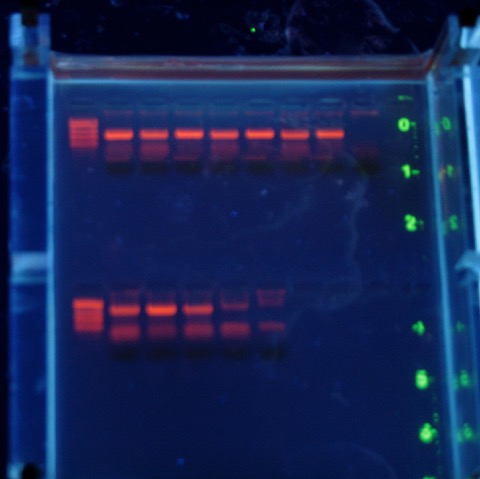
(which reminds me, I didn’t post any of the great pictures I took when in the intertidal just south of Coquimbo at Toloralillo; see chitons above, and Katie with a porcelain crab below) Edit: not sure why the chitons are not showing up, and an old picture of an agarose gel in their place. Such is technology some days. I’ll fix it later.
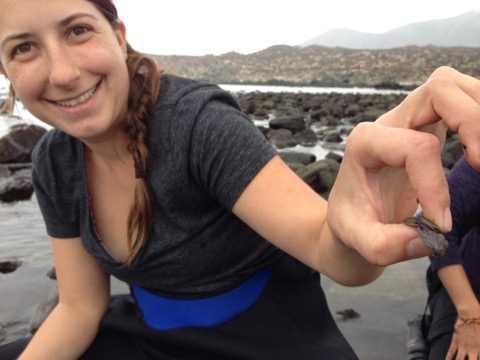
It’s a good thing to find such connections, even 140 characters at a time. Unfortunately I’ll be missing some genuine in-person connections next week when the #Evol2014 (Evolution) meetings take place in Raleigh, NC. This is generally one of my favorite meetings each summer, primarily for the good connections I’ve made over the nearly 20 years I’ve been a biologist. But, I went last year and gave a reasonable update on my work, saw many people, and this year I have personal (fun) conflicts - choices have to be made. So, keep me posted with the latest from your lab, and if you get a chance (though I think only 3 people read this, none of whom are attending the SSE meeting....) I recommend adding these talks to your slate!

(which reminds me, I didn’t post any of the great pictures I took when in the intertidal just south of Coquimbo at Toloralillo; see chitons above, and Katie with a porcelain crab below) Edit: not sure why the chitons are not showing up, and an old picture of an agarose gel in their place. Such is technology some days. I’ll fix it later.

It’s a good thing to find such connections, even 140 characters at a time. Unfortunately I’ll be missing some genuine in-person connections next week when the #Evol2014 (Evolution) meetings take place in Raleigh, NC. This is generally one of my favorite meetings each summer, primarily for the good connections I’ve made over the nearly 20 years I’ve been a biologist. But, I went last year and gave a reasonable update on my work, saw many people, and this year I have personal (fun) conflicts - choices have to be made. So, keep me posted with the latest from your lab, and if you get a chance (though I think only 3 people read this, none of whom are attending the SSE meeting....) I recommend adding these talks to your slate!
| 1D_206 Modes of Reproduction | Date: Saturday, June 21, 2014 | Time: 3:15 PM - 4:30 PM | Location: 206 | Chair: Andrea Case | 4:15 PM - 4:30 PM | When sex allocation theory and reality meet: Insights from size-specific reproductive investment in an androdioecious barnacle | |||||||
| 1B_306A Biodiversity | Date: Saturday, June 21, 2014 | Time: 10:15 AM - 11:30 AM | Location: 306 A | Chair: Latiffah Zakaria | 10:30 AM - 10:45 AM | Description of a Novel Genetic Marker for Species Identification of Freshwater Mussel Larvae Recovered from Naturally Infested Fish Hosts | |||||||
| 3C_302A Speciation | Date: Monday, June 23, 2014 | Time: 1:30 PM - 2:45 PM | Location: 302 A | Chair: Alycia Lackey | 1:30 PM - 1:45 PM | What drives genetic and phenotypic divergence for Iris hexagona | |||||||
Quammen
27/05/13 12:37
If you are even a little bit interested in the travails of 19th-century naturalists and want to know more about the field of biogeography and what it can say about the current extinction crisis our planet is in, I highly recommend David Quammen’s The Song of the Dodo. A phenomenal book on diversity, conservation, biogeography, and evolution. The experience and wisdom involved in writing this book is enviable.
Teaching
30/09/11 13:09
I’ve just about finished my first stand as lecturer in our Intro Evolution course at UGA, a class that started with 197 students... I think it is safe to say there are fewer now after the first exam. I have one lecture to give and am really grateful to the students as they put up with me figuring out the dynamics of a class that size, I’m only now getting more comfortable with singling people out so I get answers to my questions that are more audible than a group mumble. Yesterday I said, “You, Duke shirt” to get a response from a woman wearing a Duke football jersey. I mean, if you don’t want to get called on in class you have to wear something more inconspicuous than the football jersey for a school that barely plays football :)
Our labs genome data are slowly coming in; all of the Illumina data for Serratia are back, and Ron Eytan is busily figuring out how to assemble the bacterial genomes. The Georgia Genomics Facility is having some technical difficulties with the 454 sequencer, so that project has been slowed down considerably. And hopefully soon the data will be back for the work in Chile, which - now that I think about it, I leave for Chile in less than 3 weeks, so having those data would be nice!
Our labs genome data are slowly coming in; all of the Illumina data for Serratia are back, and Ron Eytan is busily figuring out how to assemble the bacterial genomes. The Georgia Genomics Facility is having some technical difficulties with the 454 sequencer, so that project has been slowed down considerably. And hopefully soon the data will be back for the work in Chile, which - now that I think about it, I leave for Chile in less than 3 weeks, so having those data would be nice!
Portland
07/07/10 10:15
Just got back from a fantastic trip to Oregon. My lab attended the Evolution meetings in Portland, everybody gave a fantastic talk and we had really good interactions with the swarm of evolution geeks that, like good social organisms, found and followed trails to good brewpubs, restaurants, and other fun things in that beautiful city. Afterward, my family and I had a great time touring the city and heading out to the coast for a few days of R & R.
The only conundrum that remains from great meetings like this - aside from how to respond to all the great ideas that come from talking to so many talented colleagues - is the ugly environmental side of meetings. The organizers in Portland went to lengths to put us somewhere that required no driving, they encouraged bringing reusable cups, and Portland is an extremely green city. But the carbon footprint of flight cannot be ignored. There is no replacement for face-to-face interactions at these meetings; in particular, I’m thinking of some of the extraordinary grad students I talked with over the course of three days about their work and their future plans. But, we can’t ignore the impact of air travel, which sadly negates many of the things we struggle towards with our reusable cups, cycling to work, and unplugging unused appliances. The figure below was taken from a recent story in Mother Jones, and makes me queasy about the 2 flights I’ve already committed to later in 2010, and probably another 1-2 in the next year.
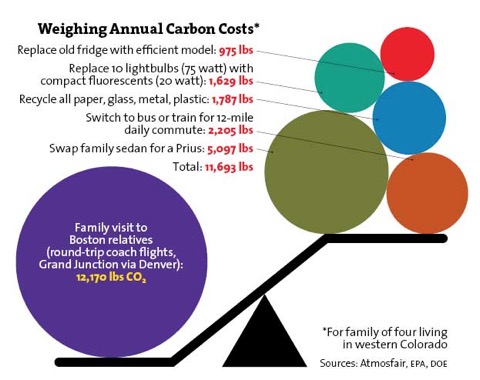
What I am going to do is something that is good for me and my family as well as for the environment. I don’t like being away too much - sometimes it is necessary, but sometimes as scientists we accept invitations to do things that mean little for our work (and more for our egos or careers). If Steve X invites me to give a talk at Fantastic University, it may be flattering and I may gain professionally, but it is not generally critical for my life or my ongoing projects. So, I’m capping myself to 4 air trips a year. That may be tough. I may have to drive to some places I ordinarily would fly to, or figure out Amtrak in the southeastern U.S. (it isn’t good, we are far behind Europe and California in this regard, look at this schedule and price for a trip to Miami!).
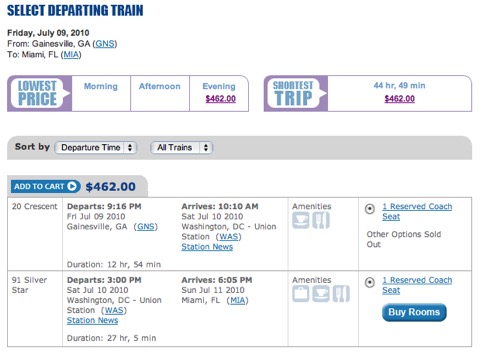
I hope my colleagues understand, but having this excuse is also good for making sure I’m home with my family just a little bit more as well.
The only conundrum that remains from great meetings like this - aside from how to respond to all the great ideas that come from talking to so many talented colleagues - is the ugly environmental side of meetings. The organizers in Portland went to lengths to put us somewhere that required no driving, they encouraged bringing reusable cups, and Portland is an extremely green city. But the carbon footprint of flight cannot be ignored. There is no replacement for face-to-face interactions at these meetings; in particular, I’m thinking of some of the extraordinary grad students I talked with over the course of three days about their work and their future plans. But, we can’t ignore the impact of air travel, which sadly negates many of the things we struggle towards with our reusable cups, cycling to work, and unplugging unused appliances. The figure below was taken from a recent story in Mother Jones, and makes me queasy about the 2 flights I’ve already committed to later in 2010, and probably another 1-2 in the next year.

What I am going to do is something that is good for me and my family as well as for the environment. I don’t like being away too much - sometimes it is necessary, but sometimes as scientists we accept invitations to do things that mean little for our work (and more for our egos or careers). If Steve X invites me to give a talk at Fantastic University, it may be flattering and I may gain professionally, but it is not generally critical for my life or my ongoing projects. So, I’m capping myself to 4 air trips a year. That may be tough. I may have to drive to some places I ordinarily would fly to, or figure out Amtrak in the southeastern U.S. (it isn’t good, we are far behind Europe and California in this regard, look at this schedule and price for a trip to Miami!).

I hope my colleagues understand, but having this excuse is also good for making sure I’m home with my family just a little bit more as well.